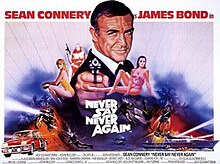Fatima Blush
| Never Say Never Again | |
|---|---|

British cinema poster for Never Say Never Again, illustrated by Renato Casaro
|
|
| Directed by | Irvin Kershner |
| Produced by | Jack Schwartzman |
| Screenplay by |
Lorenzo Semple Jr. Uncredited: Dick Clement Ian La Frenais |
| Story by |
Kevin McClory Jack Whittingham Ian Fleming |
| Based on |
Thunderball by Ian Fleming |
| Starring | |
| Music by | Michel Legrand |
| Cinematography | Douglas Slocombe |
| Edited by | Ian Crafford |
|
Production
company |
Taliafilm
Producers Sales Organization |
| Distributed by | Warner Bros. |
|
Release date
|
|
|
Running time
|
134 minutes |
| Country | United Kingdom United States |
| Language | English |
| Budget | $36 million |
| Box office | $160 million |
Never Say Never Again is a 1983 spy film directed by Irvin Kershner, produced by Jack Schwartzman, and written by Lorenzo Semple Jr. with uncredited additional co-writers Dick Clement and Ian La Frenais, from a story by Kevin McClory, Jack Whittingham, and Ian Fleming. It is the second adaption of Fleming's Thunderball, which was previously adapted as the 1965 film of the same name. Unlike the majority of Bond films, Never Say Never Again was not produced by Eon Productions, but by an independent production company, one of whose members was Kevin McClory. McClory, one of the original writers of the Thunderball storyline, retained the filming rights of the novel following a rights controversy.
Sean Connery played the role of James Bond for the seventh and final time, marking his return to the character 12 years after Diamonds Are Forever. The film's title is a reference to Connery's reported declaration in 1971 that he would "never again" play that role. As Connery was 52 at the time of filming, the storyline features an aging Bond, who is brought back into action to investigate the theft of two nuclear weapons by SPECTRE. Filming locations included France, Spain, the Bahamas and Elstree Studios in England.
Never Say Never Again was released by Warner Bros. in autumn 1983, opening to positive reviews and was a commercial success, grossing $160 million at the box office, although less overall than the Eon-produced Octopussy released in the same year. Metro-Goldwyn-Mayer, to date, owns the distribution rights and also distributes Eon's Bond films, and the company has handled subsequent home video releases of the film.
...
Wikipedia
